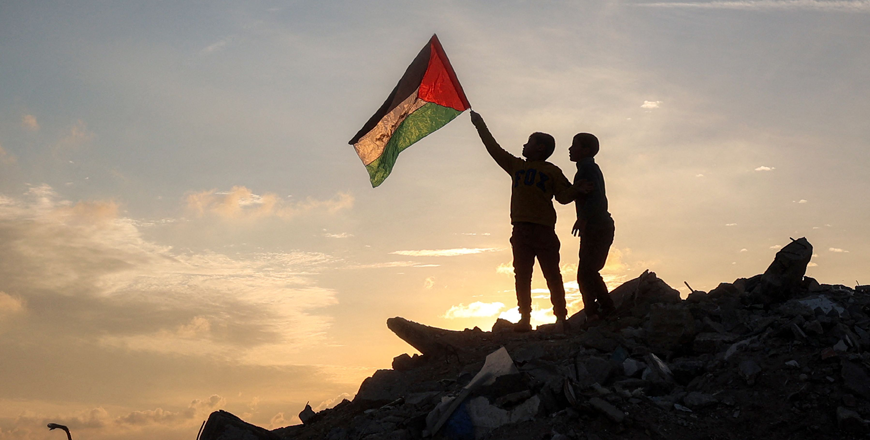OCCUPIED JERUSALEM — A ceasefire in the Gaza war will begin Sunday morning at 0630 GMT, mediator Qatar said on Saturday after Israel's cabinet voted to approve the truce and hostage-prisoner release deal.
The exact time of the ceasefire's start had been unclear, though Israel had said no Palestinian prisoners held by Israel would be freed before late Sunday afternoon.
Qatar and the United States, which mediated the deal along with Egypt, had announced it on Wednesday and said it would take effect Sunday.
Following that announcement, Israeli bombardment of the territory killed at least 113 people, Gaza's civil defence rescue agency said on Friday.
On Saturday, AFP photos showed Palestinians in the southern city of Khan Yunis mourning four members of a family killed in another Israeli strike.
Explosions were heard over Jerusalem Saturday morning after warning sirens blared and the military said a projectile had been launched from Yemen, whose Iran-backed rebels say they support the Palestinians.
"As coordinated by the parties to the agreement and the mediators, the ceasefire in the Gaza Strip will begin at 8:30 am on Sunday, January 19, local time in Gaza," Qatar's foreign ministry spokesman Majed al-Ansari said on X.
"We advise the inhabitants to take precaution, exercise the utmost caution, and wait for directions from official sources."
In more than 15 months of Israeli war on Gaza, there has been only one previous truce, for one week, in November 2023. That deal also saw the release of hostages held by the militants in exchange for Palestinian prisoners.
"The government has approved the hostage return plan," the office of Prime Minister Benjamin Netanyahu said early Saturday after the cabinet held its vote.
Netanyahu's office said the deal "supports achieving the objectives of the war".
Israel's justice ministry said 737 Palestinian prisoners and detainees will be freed as part of the first phase of the deal -- none before 4:00 pm local time (1400 GMT) on Sunday.
Trump
Qatari Prime Minister Sheikh Mohammed bin Abdulrahman bin Jassim Al Thani, announcing the agreement on Wednesday, said an initial 42-day ceasefire would see 33 hostages released by militants in Gaza.
The truce is to take effect on the eve of Donald Trump's inauguration for a second term as United States president.
Palestinian President Mahmud Abbas said the Palestinian Authority, which has partial administrative control in the Israeli-occupied West Bank, has completed preparations "to assume full responsibility in Gaza" after the war.
Israel has no definitive stance on post-war governance beyond rejecting any role for both Hamas and the Palestinian Authority.
Outgoing US Secretary of State Antony Blinken said Gaza should be under PA control.
Even before the truce begins, displaced Gazans were preparing to return home.
"I will go to kiss my land," said Nasr Al Gharabli, who fled his home in Gaza City for a camp further south. "If I die on my land, it would be better than being here as a displaced person."
In Israel, there was joy but also anguish over the remaining hostages taken in the Hamas attack.
Kfir Bibas, whose second birthday falls on Saturday, is the youngest captive.
Hamas said in November 2023 that Kfir, his four-year-old brother Ariel and their mother Shiri had died in an air strike, but with the Israeli military yet to confirm their deaths, many are clinging to hope.
Israel's cabinet endorsement of the deal came despite eight ministers voting against it, including far-right ministers Itamar Ben Gvir and Bezalel Smotrich.
Hamas's armed wing warned that continued Israeli strikes risked the lives of hostages and could turn their "freedom... into a tragedy".
Hamas's October 7, 2023 attack on Israel triggered the war and resulted in the deaths of 1,210 people, mostly civilians, according to an AFP tally of Israeli official figures.
Of the 251 people taken hostage, 94 are still in Gaza, including 34 the Israeli military says are dead.
Israel's retaliatory campaign has destroyed much of Gaza, killing 46,876 people, most of them civilians, according to figures from the Hamas-run territory's health ministry that the United Nations considers reliable.
Aid-starved
Mediators had worked for months to reach a deal but the efforts were fruitless until Trump's inauguration neared.
Brett McGurk, the pointman for outgoing President Joe Biden, was joined in the region by Trump envoy Steve Witkoff in an unusual pairing to finalise the agreement, US officials said.
On Friday, Qatar's Sheikh Mohammed said: "We seek a full implementation of the first phase, and for the second phase to be the final.
"We are waiting for the Security Council to issue a binding resolution to implement the agreement."
Israeli authorities assume the 33 captives to be released in the first phase are alive, but Hamas has yet to confirm that.
Also in the first phase, Israeli forces would withdraw from Gaza's densely populated areas and allow displaced Palestinians to return "to their residences", the Qatari prime minister said.
An Israeli military official said reception points had been established at Kerem Shalom, Erez and Reim, where hostages would be joined by doctors and mental health specialists before being "transported via helicopter or vehicle" to hospitals in Israel.
Israel "is then expected to release the first group of Palestinian prisoners, including several with high sentences", a source said on condition of anonymity.
During talks on Friday, negotiators agreed to form a joint operations room in Cairo to "ensure effective coordination" and compliance with the truce terms, Egyptian state-linked media reported.
Biden said the second phase could bring a "permanent end to the war".
In aid-starved Gaza, humanitarian workers caution a monumental task lies ahead.
On Friday, British lawmakers warned that Israeli legislation banning the UN agency for Palestinian refugees, UNRWA, threatens the truce deal. The ban on the main aid agency in Gaza is to take effect by the end of January.
